School+of+Electrical+Engineering
-
 Seong-Tae Kim Wins Robert-Wagner All-Conference Best Paper Award
(Ph.D. candidate Seong-Tae Kim)
Ph.D. candidate Seong-Tae Kim from the School of Electrical Engineering won the Robert Wagner All-Conference Best Student Paper Award during the 2018 International Society for Optics and Photonics (SPIE) Medical Imaging Conference, which was held in Houston last month.
Kim, supervised by Professor Yong Man Ro, received the award for his paper in the category of computer-aided diagnosis. His paper, titled “ICADx: Interpretable Computer-Aided Diagnosis of Breast Masses”, was selected as the best paper out of 900 submissions. The conference selects the best paper in nine different categories. His research provides new insights on diagnostic technology to detect breast cancer powered by deep learning.
2018.03.15 View 11196
Seong-Tae Kim Wins Robert-Wagner All-Conference Best Paper Award
(Ph.D. candidate Seong-Tae Kim)
Ph.D. candidate Seong-Tae Kim from the School of Electrical Engineering won the Robert Wagner All-Conference Best Student Paper Award during the 2018 International Society for Optics and Photonics (SPIE) Medical Imaging Conference, which was held in Houston last month.
Kim, supervised by Professor Yong Man Ro, received the award for his paper in the category of computer-aided diagnosis. His paper, titled “ICADx: Interpretable Computer-Aided Diagnosis of Breast Masses”, was selected as the best paper out of 900 submissions. The conference selects the best paper in nine different categories. His research provides new insights on diagnostic technology to detect breast cancer powered by deep learning.
2018.03.15 View 11196 -
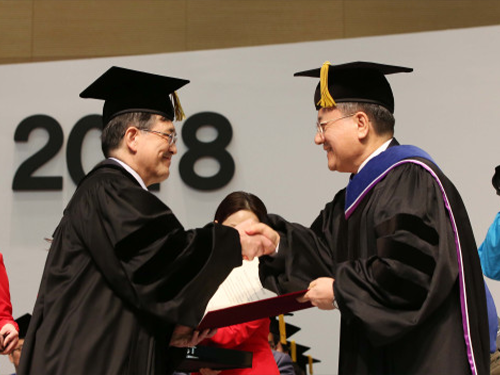 Samsung Electronics' Chairman Kwon Becomes the First Alumnus Honorary Doctorate
(Samsung Electronics' Chairman & CEO Kwon,left, and President Shin)
The semiconductor has bred innovation in Korea, as one of the staples of economic growth. Without the success of the semiconductor industry of Korea, it is hard to imagine the high tech dominance in the global market enjoyed by Korean companies.
It is said that one in every four Ph.D.s working in the semiconductor industry of Korea graduated from KAIST. Among them, Chairman and CEO Oh-Hyun Kwon of Samsung Electronics, Class of 1977, has arrived at the epitome of this top industry.
KAIST’s class of 1977 produced many movers and shakers in Korea’s innovation efforts. Now in their mid-60s, they were the players who embodied Korea’s ICT and helped it become a global powerhouse. They are the ones who worked for and witnessed the socio-economic transformation of Korea through innovation.
In recognition of his unsurpassable entrepreneurship, which made the remarkable strides in the semiconductor and electronics industry in Korea and beyond, Chairman Kwon was honored as the first recipient of an honorary doctorate from his alma mater on February 23 during the 2018 commencement ceremony.
After completing his Master's in Electrical Engineering at KAIST in 1977, he earned his Ph.D. in Electrical Engineering from Stanford University. The first honorary degree bestowed to an alumnus was conferred by the first alumnus President of KAIST Sung-Chul Shin. President Shin said that Chairman Kwon’s exceptional leadership has inspired the KAIST community and exemplified the spirit of KAIST.
Currently serving as chairman & CEO of Samsung Electronics and Samsung Advanced Institute of Technology (SAIT), Kwon has worked for Samsung in a variety of key positions in their semiconductor division since 1985.
In the mid-1980s, Japan was leading the global semiconductor market. At Samsung, Chairman Kwon, who was in charge of the memory semiconductor team, successfully developed 4M DRAM. Later in 1992, he played a leading role in the development of the world’s first 64M DRAM.
The success of 4M DRAM and 64M DRAM led Samsung to clinch the top position in the DRAM and NAND flash business around the world. This helped Samsung emerge as a global leader in the semiconductor industry.
As a result, Samsung, as well as the national economy, could gain significant momentum to build national competitiveness and economic growth. The outstanding technological leadership of Chairman Kwon led to the development of proprietary semiconductor design and processes technologies as well as numerous patents.
He also played a leadership role in creating a mutual growth environment among conglomerates rather than merely engaging in direct competition. Chairman Kwon made every effort to establish the cornerstone of mutual growth, especially in relationships with small and medium-sized enterprises (SMEs). His win-win collaboration initiatives among conglomerates and SMEs made a significant impact on the development of the entire industry of Korea.
In his acceptance speech, he charged the graduates to embrace challenges, to collaborate with peers, and create their own future.
The full text of his speech is printed below.
Graduates and distinguished guests! I extend my sincere congratulations to my fellow graduates, as you are awarded degrees for your deep efforts, as well as to the parents and family members who have supported you.
In 1977, I received my Master’s degree in Electrical Engineering from KAIST. Today, as the first honorary doctor among KAIST graduates, I am truly honored to be here. I am deeply grateful to all of you, including President Sung-Chul Shin and the Chairman of the Board of Trustees, Jang-Moo Lee.
Today, I want to tell you about the experiences and lessons I have learned from my 40 years of corporate management experience.
First, you should lead and drive changes by yourself. In the process of realizing a dream, the situation and circumstances do not always proceed as you planned.
I started my career as a researcher. However, I had to continuously transform myself into a project leader, business team leader, and CEO. It was challenging every time, due to a lack of preparing and my insufficient ability. However, I have always accomplished the intended goal through the mindset of embracing changes and studying new things.
It is said that the survivors are not always the strongest nor the most intelligent, but the ones who are the most adaptive to changes. We can only be the last survivor if we have the character to see those small signs that signal changes are coming and cope with changes well. Take changes positively and actively and then, transform yourself to match a given situation.
In addition, it is important to understand others. When it comes to one’s career, there is nothing that you can do alone without the assistance of others. If it is not possible to do everything by yourself, you will need to supplement your efforts through the help of others. To do this, you need to understand your colleagues, bosses, and customers first.
People, who work in tech tend to cage themselves in their own silos. But in an era of destructive innovation, where boundaries of industries and technologies are collapsing at a breakneck pace, scientists also need to enhance their understanding of various areas such as culture, art, and the humanities.
This is a famous verse from a poem by Chun-Soo Kim.
Before I called his name,
He was nothing but a gesture.
When I called his name, He came to me and became a flower.
Make wonderful synergy by making your partner a flower and complementing each other. When you first notice the true value of another person and interact with them, the value of the individual will be doubled and will bring about a greater impact.
Finally, we all need to cooperate with each other. All of you here, including myself, are people who have benefited from society. We must cooperate with each other and give back to society for the best results.
A biologist once said that incremental evolution comes from competition, but fundamental evolution comes from cooperation. Great leaders should achieve results through cooperation rather than competition.
You are the future leaders with top-class knowledge. I hope you will become great leaders who have wisdom that combines external resources with your abilities.
Now, graduates of 2018 who are standing at the starting line, we often worry about an unpredictable tomorrow. However, the smartest way to predict the future is to create the future for ourselves. Moreover, we can try again even though we sometimes make mistakes. I urge you to make future you are hoping for.
Once again, I would like to thank you for this honorary doctorate and extend my sincere wishes for the endless development of KAIST and the best of luck to the futures of these graduates. Thank you.
2018.02.26 View 8459
Samsung Electronics' Chairman Kwon Becomes the First Alumnus Honorary Doctorate
(Samsung Electronics' Chairman & CEO Kwon,left, and President Shin)
The semiconductor has bred innovation in Korea, as one of the staples of economic growth. Without the success of the semiconductor industry of Korea, it is hard to imagine the high tech dominance in the global market enjoyed by Korean companies.
It is said that one in every four Ph.D.s working in the semiconductor industry of Korea graduated from KAIST. Among them, Chairman and CEO Oh-Hyun Kwon of Samsung Electronics, Class of 1977, has arrived at the epitome of this top industry.
KAIST’s class of 1977 produced many movers and shakers in Korea’s innovation efforts. Now in their mid-60s, they were the players who embodied Korea’s ICT and helped it become a global powerhouse. They are the ones who worked for and witnessed the socio-economic transformation of Korea through innovation.
In recognition of his unsurpassable entrepreneurship, which made the remarkable strides in the semiconductor and electronics industry in Korea and beyond, Chairman Kwon was honored as the first recipient of an honorary doctorate from his alma mater on February 23 during the 2018 commencement ceremony.
After completing his Master's in Electrical Engineering at KAIST in 1977, he earned his Ph.D. in Electrical Engineering from Stanford University. The first honorary degree bestowed to an alumnus was conferred by the first alumnus President of KAIST Sung-Chul Shin. President Shin said that Chairman Kwon’s exceptional leadership has inspired the KAIST community and exemplified the spirit of KAIST.
Currently serving as chairman & CEO of Samsung Electronics and Samsung Advanced Institute of Technology (SAIT), Kwon has worked for Samsung in a variety of key positions in their semiconductor division since 1985.
In the mid-1980s, Japan was leading the global semiconductor market. At Samsung, Chairman Kwon, who was in charge of the memory semiconductor team, successfully developed 4M DRAM. Later in 1992, he played a leading role in the development of the world’s first 64M DRAM.
The success of 4M DRAM and 64M DRAM led Samsung to clinch the top position in the DRAM and NAND flash business around the world. This helped Samsung emerge as a global leader in the semiconductor industry.
As a result, Samsung, as well as the national economy, could gain significant momentum to build national competitiveness and economic growth. The outstanding technological leadership of Chairman Kwon led to the development of proprietary semiconductor design and processes technologies as well as numerous patents.
He also played a leadership role in creating a mutual growth environment among conglomerates rather than merely engaging in direct competition. Chairman Kwon made every effort to establish the cornerstone of mutual growth, especially in relationships with small and medium-sized enterprises (SMEs). His win-win collaboration initiatives among conglomerates and SMEs made a significant impact on the development of the entire industry of Korea.
In his acceptance speech, he charged the graduates to embrace challenges, to collaborate with peers, and create their own future.
The full text of his speech is printed below.
Graduates and distinguished guests! I extend my sincere congratulations to my fellow graduates, as you are awarded degrees for your deep efforts, as well as to the parents and family members who have supported you.
In 1977, I received my Master’s degree in Electrical Engineering from KAIST. Today, as the first honorary doctor among KAIST graduates, I am truly honored to be here. I am deeply grateful to all of you, including President Sung-Chul Shin and the Chairman of the Board of Trustees, Jang-Moo Lee.
Today, I want to tell you about the experiences and lessons I have learned from my 40 years of corporate management experience.
First, you should lead and drive changes by yourself. In the process of realizing a dream, the situation and circumstances do not always proceed as you planned.
I started my career as a researcher. However, I had to continuously transform myself into a project leader, business team leader, and CEO. It was challenging every time, due to a lack of preparing and my insufficient ability. However, I have always accomplished the intended goal through the mindset of embracing changes and studying new things.
It is said that the survivors are not always the strongest nor the most intelligent, but the ones who are the most adaptive to changes. We can only be the last survivor if we have the character to see those small signs that signal changes are coming and cope with changes well. Take changes positively and actively and then, transform yourself to match a given situation.
In addition, it is important to understand others. When it comes to one’s career, there is nothing that you can do alone without the assistance of others. If it is not possible to do everything by yourself, you will need to supplement your efforts through the help of others. To do this, you need to understand your colleagues, bosses, and customers first.
People, who work in tech tend to cage themselves in their own silos. But in an era of destructive innovation, where boundaries of industries and technologies are collapsing at a breakneck pace, scientists also need to enhance their understanding of various areas such as culture, art, and the humanities.
This is a famous verse from a poem by Chun-Soo Kim.
Before I called his name,
He was nothing but a gesture.
When I called his name, He came to me and became a flower.
Make wonderful synergy by making your partner a flower and complementing each other. When you first notice the true value of another person and interact with them, the value of the individual will be doubled and will bring about a greater impact.
Finally, we all need to cooperate with each other. All of you here, including myself, are people who have benefited from society. We must cooperate with each other and give back to society for the best results.
A biologist once said that incremental evolution comes from competition, but fundamental evolution comes from cooperation. Great leaders should achieve results through cooperation rather than competition.
You are the future leaders with top-class knowledge. I hope you will become great leaders who have wisdom that combines external resources with your abilities.
Now, graduates of 2018 who are standing at the starting line, we often worry about an unpredictable tomorrow. However, the smartest way to predict the future is to create the future for ourselves. Moreover, we can try again even though we sometimes make mistakes. I urge you to make future you are hoping for.
Once again, I would like to thank you for this honorary doctorate and extend my sincere wishes for the endless development of KAIST and the best of luck to the futures of these graduates. Thank you.
2018.02.26 View 8459 -
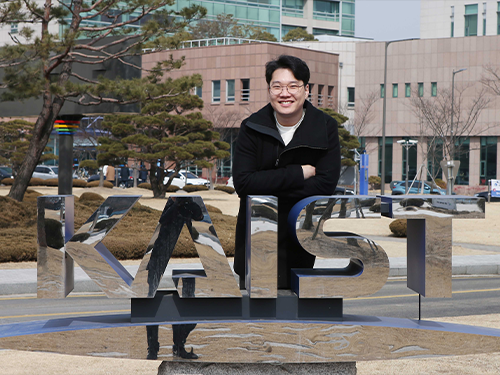 Soul-Searching & Odds-Defying Determination: A Commencement Story of Dr. Tae-Hyun Oh
(Dr. Tae-Hyun Oh, one of the 2736 graduates of the 2018)
Each and every one of the 2,736 graduates has come a long way to the 2018 Commencement. Tae-Hyun Oh, who just started his new research career at MIT after completing his Ph.D. at KAIST, is no exception.
Unlike the most KAIST freshmen straight out of the ingenious science academies of Korea, he is among the many who endured very challenging and turbulent adolescent years. Buffeted by family instability and struggling during his time at school, he saw himself trapped by seemingly impenetrable barriers. His mother, who hated to see his struggling, advised him to take a break to reflect on who he is and what he wanted to do.
After dropping out of high school in his first year, ways to make money and support his family occupied his thoughts. He took on odd jobs from a car body shop to a gas station, but the real world was very tough and sometimes even cruel to the high school dropout.
Bias and prejudice stigmatizing dropouts hurt him so much. He often overheard a parent who dropped by the body shop that he worked in saying, “If you do not study hard, you will end up like this guy.” Hearing such things terrified him and awoke his sense of purpose. So he decided to do something meaningful and be a better man than he was.
“I didn’t like the person I was growing up to become. I needed to find myself and get away from the place I was growing up. It was my adventure and it was the best decision I ever made,” says Oh.
After completing his high school diploma national certificate, he planned to apply to an engineering college. On his second try, he gained admission into the Department of Electrical Engineering at Kwang Woon University with a full scholarship. He was so thrilled for this opportunity and hoped he could do well at college. Signal processing and image processing became the interest of his research and he finished his undergraduate degree summa cum laude.
Gaining confidence in his studies, he searched around graduate school department websites in Korea to select the path he was interested in. Among others, the Robotics and Computer Vision Lab of Professor In-So Kweon at the Department of Electrical Engineering at KAIST was attractive to him.
Professor Kweon’s lab is globally renowned for robot vision technology. Their technologies were applied into HUBO, the KAIST-developed bimodal humanoid robot that won the 2015 DARPA Challenges.
“I am so appreciate of Professor Kweon, who accepted and guided me,” he said. Under Professor Kweon’s advising, he could finish his Master’s and Ph.D. courses in seven years. The mathematical modeling on fundamental computer algorithms became his main research topic.
While at KAIST, his academic research has blossomed. He won a total of 13 research prizes sponsored by corporations at home and abroad such as Kolon, Samsung, Hyundai Motors, and Qualcomm.
In 2015, he won the Microsoft Research Asia Fellowship as the sole Korean among 13 Ph.D. candidates in the Asian region. With the MSRA fellowship, he could intern at the MS Research Beijing Office for half a year and then in Redmond, Washington in the US.
“Professor Kweon’s lab filled me up with knowledge. Whenever I presented our team’s paper at an international conference, I was amazed by the strong interest shown by foreign experts, researchers, and professors. Their strong support and interest encouraged me a lot. I was fully charged with the belief that I could go abroad and explore more opportunities,” he said.
Dr. Oh, who completed his dissertation last fall, now works at the Department of Electrical Engineering and Computer Science at MIT under Professor Wojciech Matusik.
“I think the research environment at KAIST is on par with MIT. I have very rich resources for my studies and research at both schools, but at MIT the working culture is a little different and it remains a big challenge for me. I am still not familiar with collaborative work with colleagues from very diverse backgrounds and countries, and to persuade them and communicate with them is very tough. But I think I am getting better and better,” he said.
Oh, who is an avid computer game player as well, said life seems to be a game. The level of the game will be upgraded to the next level after something is accomplished. He feels great joy when he is moving up and he believes such diverse experiences have helped him become a better person day by day. Once he identified what gave him a strong sense of purpose, he wasn’t stressed out by his studies any more. He was so excited to be able to follow his passion and is ready for the next challenge.
2018.02.23 View 11379
Soul-Searching & Odds-Defying Determination: A Commencement Story of Dr. Tae-Hyun Oh
(Dr. Tae-Hyun Oh, one of the 2736 graduates of the 2018)
Each and every one of the 2,736 graduates has come a long way to the 2018 Commencement. Tae-Hyun Oh, who just started his new research career at MIT after completing his Ph.D. at KAIST, is no exception.
Unlike the most KAIST freshmen straight out of the ingenious science academies of Korea, he is among the many who endured very challenging and turbulent adolescent years. Buffeted by family instability and struggling during his time at school, he saw himself trapped by seemingly impenetrable barriers. His mother, who hated to see his struggling, advised him to take a break to reflect on who he is and what he wanted to do.
After dropping out of high school in his first year, ways to make money and support his family occupied his thoughts. He took on odd jobs from a car body shop to a gas station, but the real world was very tough and sometimes even cruel to the high school dropout.
Bias and prejudice stigmatizing dropouts hurt him so much. He often overheard a parent who dropped by the body shop that he worked in saying, “If you do not study hard, you will end up like this guy.” Hearing such things terrified him and awoke his sense of purpose. So he decided to do something meaningful and be a better man than he was.
“I didn’t like the person I was growing up to become. I needed to find myself and get away from the place I was growing up. It was my adventure and it was the best decision I ever made,” says Oh.
After completing his high school diploma national certificate, he planned to apply to an engineering college. On his second try, he gained admission into the Department of Electrical Engineering at Kwang Woon University with a full scholarship. He was so thrilled for this opportunity and hoped he could do well at college. Signal processing and image processing became the interest of his research and he finished his undergraduate degree summa cum laude.
Gaining confidence in his studies, he searched around graduate school department websites in Korea to select the path he was interested in. Among others, the Robotics and Computer Vision Lab of Professor In-So Kweon at the Department of Electrical Engineering at KAIST was attractive to him.
Professor Kweon’s lab is globally renowned for robot vision technology. Their technologies were applied into HUBO, the KAIST-developed bimodal humanoid robot that won the 2015 DARPA Challenges.
“I am so appreciate of Professor Kweon, who accepted and guided me,” he said. Under Professor Kweon’s advising, he could finish his Master’s and Ph.D. courses in seven years. The mathematical modeling on fundamental computer algorithms became his main research topic.
While at KAIST, his academic research has blossomed. He won a total of 13 research prizes sponsored by corporations at home and abroad such as Kolon, Samsung, Hyundai Motors, and Qualcomm.
In 2015, he won the Microsoft Research Asia Fellowship as the sole Korean among 13 Ph.D. candidates in the Asian region. With the MSRA fellowship, he could intern at the MS Research Beijing Office for half a year and then in Redmond, Washington in the US.
“Professor Kweon’s lab filled me up with knowledge. Whenever I presented our team’s paper at an international conference, I was amazed by the strong interest shown by foreign experts, researchers, and professors. Their strong support and interest encouraged me a lot. I was fully charged with the belief that I could go abroad and explore more opportunities,” he said.
Dr. Oh, who completed his dissertation last fall, now works at the Department of Electrical Engineering and Computer Science at MIT under Professor Wojciech Matusik.
“I think the research environment at KAIST is on par with MIT. I have very rich resources for my studies and research at both schools, but at MIT the working culture is a little different and it remains a big challenge for me. I am still not familiar with collaborative work with colleagues from very diverse backgrounds and countries, and to persuade them and communicate with them is very tough. But I think I am getting better and better,” he said.
Oh, who is an avid computer game player as well, said life seems to be a game. The level of the game will be upgraded to the next level after something is accomplished. He feels great joy when he is moving up and he believes such diverse experiences have helped him become a better person day by day. Once he identified what gave him a strong sense of purpose, he wasn’t stressed out by his studies any more. He was so excited to be able to follow his passion and is ready for the next challenge.
2018.02.23 View 11379 -
 First Female Grand Prize Awardee of Samsung Humantech
Yeunhee Huh, PhD candidate (Professor Gyu-Hyeong Cho) from the School of Electrical Engineering received the grand prize of the 24th Humantech Paper Award. She is the first female recipient of this prize since its establishment in 1994. The Humantech Paper Award is hosted by Samsung Electronics and sponsored by the Ministry of Science and ICT with JoongAng Daily Newspaper. Her paper is titled, ‘A Hybrid Structure Dual-Path Step-Down Converter with 96.2% Peak Efficiency using 250mΩ Large-DCR Inductor’. Electronic devices require numerous chips and have a power converter to supply energy adequately. She proposed a new structure to enhance energy efficiency by combining inductors and capacitors. Enhancing energy efficiency can reduce energy loss, which prolongs battery hours and solves overheating of devices; for instance, energy loss leads to the overheating issue affecting phone chargers. This technology can be applied to various electronic devices, such as cell phones, laptops, and drones. Huh said, “Power has to go up in order to meet customers’ needs; however the overheating problem emerges during this process. This problem affects surrounding circuits and causes other issues, such as malfunctions of electronic devices. This technology may vary according to the conditions, but it can enhance energy efficiency up to 4%.”During the ceremony, about eight hundred million KRW worth cash prizes was conferred to 119 papers. KAIST (44 papers) and Gyeonggi Science High School (6 papers) received special awards given to the schools.
2018.02.12 View 9768
First Female Grand Prize Awardee of Samsung Humantech
Yeunhee Huh, PhD candidate (Professor Gyu-Hyeong Cho) from the School of Electrical Engineering received the grand prize of the 24th Humantech Paper Award. She is the first female recipient of this prize since its establishment in 1994. The Humantech Paper Award is hosted by Samsung Electronics and sponsored by the Ministry of Science and ICT with JoongAng Daily Newspaper. Her paper is titled, ‘A Hybrid Structure Dual-Path Step-Down Converter with 96.2% Peak Efficiency using 250mΩ Large-DCR Inductor’. Electronic devices require numerous chips and have a power converter to supply energy adequately. She proposed a new structure to enhance energy efficiency by combining inductors and capacitors. Enhancing energy efficiency can reduce energy loss, which prolongs battery hours and solves overheating of devices; for instance, energy loss leads to the overheating issue affecting phone chargers. This technology can be applied to various electronic devices, such as cell phones, laptops, and drones. Huh said, “Power has to go up in order to meet customers’ needs; however the overheating problem emerges during this process. This problem affects surrounding circuits and causes other issues, such as malfunctions of electronic devices. This technology may vary according to the conditions, but it can enhance energy efficiency up to 4%.”During the ceremony, about eight hundred million KRW worth cash prizes was conferred to 119 papers. KAIST (44 papers) and Gyeonggi Science High School (6 papers) received special awards given to the schools.
2018.02.12 View 9768 -
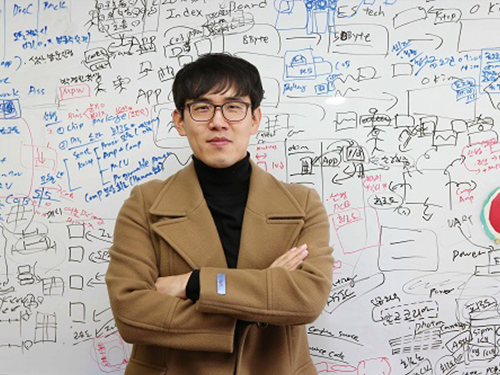 Professor Hojong Chang Wins the Best Paper Award at ISIITA 2018
Professor Hojong Chang from the KAIST Institute won the best paper award at the International Symposium on Innovation in Information Technology and Application (ISIITA) 2018.
ISIITA is a global networking symposium in which leading researchers in the field of information technology and applications gather to exchange knowledge on technological convergence.
Professor Chang won the prize for his paper, titled ‘A Study on the Measurement of Aptamer in Urine Using SiPM’.
This paper proposes using aptamer to measure and analyze the density of sodium and potassium contained in urine, allowing diseases to be diagnosed in advance.
Professor Chang said, “With a point-of-care test system that facilitates a quick diagnosis without extra processes, such as centrifugation, it is possible to get an early diagnosis and check infection in real time. Through generalizing this crucial technology, we expect to develop adequate technology for enhancing quality of life.
2018.02.12 View 8602
Professor Hojong Chang Wins the Best Paper Award at ISIITA 2018
Professor Hojong Chang from the KAIST Institute won the best paper award at the International Symposium on Innovation in Information Technology and Application (ISIITA) 2018.
ISIITA is a global networking symposium in which leading researchers in the field of information technology and applications gather to exchange knowledge on technological convergence.
Professor Chang won the prize for his paper, titled ‘A Study on the Measurement of Aptamer in Urine Using SiPM’.
This paper proposes using aptamer to measure and analyze the density of sodium and potassium contained in urine, allowing diseases to be diagnosed in advance.
Professor Chang said, “With a point-of-care test system that facilitates a quick diagnosis without extra processes, such as centrifugation, it is possible to get an early diagnosis and check infection in real time. Through generalizing this crucial technology, we expect to develop adequate technology for enhancing quality of life.
2018.02.12 View 8602 -
 Three Professors Named KAST Fellows
(Professor Dan Keun Sung at the center)
(Professor Y.H. Cho at the center)
(Professor K.H. Cho at the center)
The Korean Academy of Science and Technology (KAST) inducted three KAIST professors as fellows at the New Year’s ceremony held at KAST on January 12. They were among the 24 newly elected fellows of the most distinguished academy in Korea. The new fellows are Professor Dan Keun Sung of the School of Electrical Engineering, Professor Kwang-Hyun Cho of the Department of Bio and Brain Engineering, and Professor Yong-Hoon Cho of the Department of Physics.
Professor Sung was recognized for his lifetime academic achievements in fields related with network protocols and energy ICT. He also played a crucial role in launching the Korean satellites KITSAT-1,2,3 and the establishment of the Satellite Technology Research Center at KAIST.
Professor Y.H.Cho has been a pioneer in the field of low-dimensional semiconductor-powered quantum photonics that enables quantum optical research in solid state. He has been recognized as a renowned scholar in this field internationally.
Professor K.H.Cho has conducted original research that combines IT and BT in systems biology and has applied novel technologies of electronic modeling and computer simulation analysis for investigating complex life sciences. Professor Cho, who is in his 40s, is the youngest fellow among the newly inducted fellows.
2018.01.16 View 14813
Three Professors Named KAST Fellows
(Professor Dan Keun Sung at the center)
(Professor Y.H. Cho at the center)
(Professor K.H. Cho at the center)
The Korean Academy of Science and Technology (KAST) inducted three KAIST professors as fellows at the New Year’s ceremony held at KAST on January 12. They were among the 24 newly elected fellows of the most distinguished academy in Korea. The new fellows are Professor Dan Keun Sung of the School of Electrical Engineering, Professor Kwang-Hyun Cho of the Department of Bio and Brain Engineering, and Professor Yong-Hoon Cho of the Department of Physics.
Professor Sung was recognized for his lifetime academic achievements in fields related with network protocols and energy ICT. He also played a crucial role in launching the Korean satellites KITSAT-1,2,3 and the establishment of the Satellite Technology Research Center at KAIST.
Professor Y.H.Cho has been a pioneer in the field of low-dimensional semiconductor-powered quantum photonics that enables quantum optical research in solid state. He has been recognized as a renowned scholar in this field internationally.
Professor K.H.Cho has conducted original research that combines IT and BT in systems biology and has applied novel technologies of electronic modeling and computer simulation analysis for investigating complex life sciences. Professor Cho, who is in his 40s, is the youngest fellow among the newly inducted fellows.
2018.01.16 View 14813 -
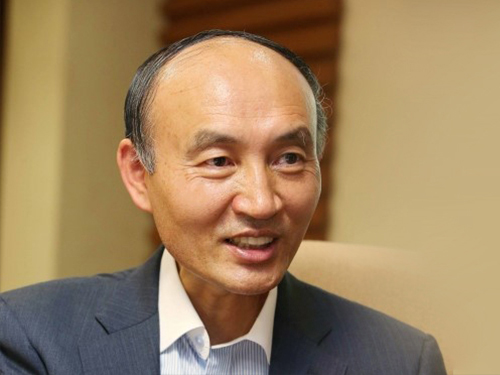 Professor Dong Ho Cho Awarded at the Haedong Conference 2017
Professor Dong Ho Cho of the School of Electrical Engineering at KAIST received an award at the 13th Haedong Conference 2017 in Seoul on the first of December.
The Korean Institute of Communications and Information Sciences recognized Professor Cho for his significant contributions in the field of mobile communication networks. He has carried out groundbreaking research on mobile systems, including architecture, protocols, algorithms, optimization, and efficiency analysis.
As a result, he has produced 73 papers in renowned international journals, 138 papers at international conferences, and filed 52 international patents and 121 domestic patents. In addition, he transferred 14 of the patents he filed to Korean and international companies.
2017.12.07 View 7029
Professor Dong Ho Cho Awarded at the Haedong Conference 2017
Professor Dong Ho Cho of the School of Electrical Engineering at KAIST received an award at the 13th Haedong Conference 2017 in Seoul on the first of December.
The Korean Institute of Communications and Information Sciences recognized Professor Cho for his significant contributions in the field of mobile communication networks. He has carried out groundbreaking research on mobile systems, including architecture, protocols, algorithms, optimization, and efficiency analysis.
As a result, he has produced 73 papers in renowned international journals, 138 papers at international conferences, and filed 52 international patents and 121 domestic patents. In addition, he transferred 14 of the patents he filed to Korean and international companies.
2017.12.07 View 7029 -
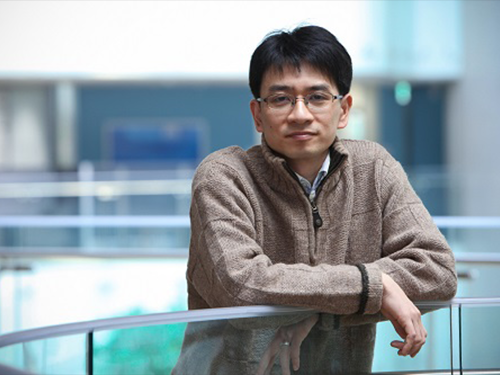 Professor Lee's Research Selected as Top 100 National R&D Projects
A research project, led by Research Professor Ju Yong Lee from the KAIST Institute for IT Convergence, was selected as one of the Top 100 National Research and Development Projects 2017.
This research project, titled LTE-A-based Single RF Small Base Station supporting Multiple Streams, developed 300Mbps low power, low complexity and broadband small base station technology that supports 4x4 MIMO (Multiple Input and Multiple Output) by proposing a new antenna structure and a new RF (Radio Frequency) structure based on LTE-A. Professors from the School of Electrical Engineering at KAIST, Dong Ho Cho, Songcheol Hong, and Yong Hoon Lee also collaborated on the project.
The existing heterodyne method of communication systems generates the problems of increasing unit price and system complexity.
In this project, however, Professor Lee directly modulated the baseband signal from the RF stage through an impedance loading-based RF chip. This method was designed to facilitate low power as well as low complexity while supporting broadband service. Based on this, his team developed source technology for RF that can be applied to fourth and even fifth generation networks.
Furthermore, this base station is smallest among the small-cell stations so far, providing an eco-friendly installation environment. It contributes to the market for fifth generation mobile communications by reducing power consumption significantly yet providing high-capacity services.
Professor Lee said, “This technology will contribute to creating a new market and additional jobs because business based on the fifth mobile generation can provide multi-functional services, including multiband. Requiring low power and providing high-capacity services anywhere at any time will enhance national competence and reduce costs for establishing a next generation mobile communication system. It is expected that this technology will help with disseminating mobile communication infrastructure through expanding information and communication system as well as the infrastructure of island areas.”
2017.11.08 View 9519
Professor Lee's Research Selected as Top 100 National R&D Projects
A research project, led by Research Professor Ju Yong Lee from the KAIST Institute for IT Convergence, was selected as one of the Top 100 National Research and Development Projects 2017.
This research project, titled LTE-A-based Single RF Small Base Station supporting Multiple Streams, developed 300Mbps low power, low complexity and broadband small base station technology that supports 4x4 MIMO (Multiple Input and Multiple Output) by proposing a new antenna structure and a new RF (Radio Frequency) structure based on LTE-A. Professors from the School of Electrical Engineering at KAIST, Dong Ho Cho, Songcheol Hong, and Yong Hoon Lee also collaborated on the project.
The existing heterodyne method of communication systems generates the problems of increasing unit price and system complexity.
In this project, however, Professor Lee directly modulated the baseband signal from the RF stage through an impedance loading-based RF chip. This method was designed to facilitate low power as well as low complexity while supporting broadband service. Based on this, his team developed source technology for RF that can be applied to fourth and even fifth generation networks.
Furthermore, this base station is smallest among the small-cell stations so far, providing an eco-friendly installation environment. It contributes to the market for fifth generation mobile communications by reducing power consumption significantly yet providing high-capacity services.
Professor Lee said, “This technology will contribute to creating a new market and additional jobs because business based on the fifth mobile generation can provide multi-functional services, including multiband. Requiring low power and providing high-capacity services anywhere at any time will enhance national competence and reduce costs for establishing a next generation mobile communication system. It is expected that this technology will help with disseminating mobile communication infrastructure through expanding information and communication system as well as the infrastructure of island areas.”
2017.11.08 View 9519 -
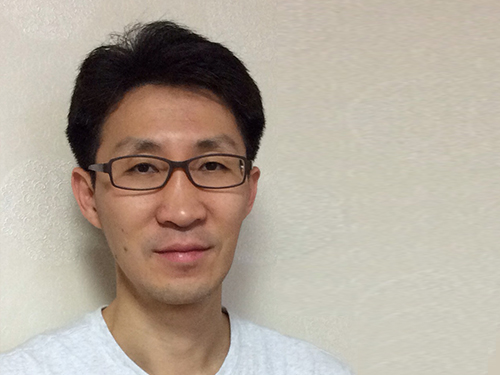 Professor Shin's Team Receives the Best Software Defined Network Solution Showcase Award
Professor Seungwon Shin of the Electrical Engineering School at KAIST and his research team won the Best Software Defined Networking (SDN) Solution Showcase Award hosted by the SDN World Congress, one of the biggest network summits held in Europe with over 2,000 participants. This year the conference took place in The Hague, the Netherlands, October 10-14, 2016.
SDN is an approach to computer networking that allows network administrators to respond quickly to changing business requirements via a centralized control console and to support the dynamic, scalable computing and storage needs of more modern computing environments such as data centers.
Collaborating with researchers from Queen’s University in the United Kingdom and Huawei, a global information and communications technology solutions provider in China, Professor Shin’s team, which is led by doctoral students Seungsoo Lee, Changhoon Yoon, and Jaehyun Nam, implemented a SDN security project called “DELTA.” ATTORESEARCH, a Korean SDN architecture and applications provider, conducted testing and verification for the project.
DELTA is a new SDN security evaluation framework with two main functions. It can automatically recognize attack cases against SDN elements across diverse environments and can assist in identifying unknown security problems within a SDN deployment.
The DELTA project consists of a control plane, the part of a network that carries signaling traffic and is responsible for routing; a data plane, the part of a network that carries user traffic; and a control channel that connects the two aforementioned planes. These three components have their own agents installed, which are all controlled by an agent manger. The agent manger can automatically detect any spots where the network security is weak.
Specifically, the project aimes to defense attacks against OpenFlow protocol, one of the first SDN standards; SDN controllers, a network operating system that is based on protocols; and network switch devices that use OpenFlow protocol.
The DELTA project was registered with the Open Networking Foundation, a user-driven organization dedicated to the promotion and adoption of SDN through open standards development, as an open source SDN security evaluation tool. This project is the only open source SDN which has been led by Korean researchers.
The SDN World Congress 2016 recognized the need for and importance of the DELTA project by conferring upon it the Best Solution Showcase Award. The Open Networking Foundation also widely publicized this award news.
Professor Shin said:
“In recent years, SDN has been attracting a large amount of interest as an emerging technology, but there still have not many SDN projects in Korea. This award acknowledges the advancement of Korean SDN technology, showing the potential for Korea to become a leader in SDN research.”
Picture: Major Components of the DELTA Project: Agents and Agent Manger
2016.10.25 View 9179
Professor Shin's Team Receives the Best Software Defined Network Solution Showcase Award
Professor Seungwon Shin of the Electrical Engineering School at KAIST and his research team won the Best Software Defined Networking (SDN) Solution Showcase Award hosted by the SDN World Congress, one of the biggest network summits held in Europe with over 2,000 participants. This year the conference took place in The Hague, the Netherlands, October 10-14, 2016.
SDN is an approach to computer networking that allows network administrators to respond quickly to changing business requirements via a centralized control console and to support the dynamic, scalable computing and storage needs of more modern computing environments such as data centers.
Collaborating with researchers from Queen’s University in the United Kingdom and Huawei, a global information and communications technology solutions provider in China, Professor Shin’s team, which is led by doctoral students Seungsoo Lee, Changhoon Yoon, and Jaehyun Nam, implemented a SDN security project called “DELTA.” ATTORESEARCH, a Korean SDN architecture and applications provider, conducted testing and verification for the project.
DELTA is a new SDN security evaluation framework with two main functions. It can automatically recognize attack cases against SDN elements across diverse environments and can assist in identifying unknown security problems within a SDN deployment.
The DELTA project consists of a control plane, the part of a network that carries signaling traffic and is responsible for routing; a data plane, the part of a network that carries user traffic; and a control channel that connects the two aforementioned planes. These three components have their own agents installed, which are all controlled by an agent manger. The agent manger can automatically detect any spots where the network security is weak.
Specifically, the project aimes to defense attacks against OpenFlow protocol, one of the first SDN standards; SDN controllers, a network operating system that is based on protocols; and network switch devices that use OpenFlow protocol.
The DELTA project was registered with the Open Networking Foundation, a user-driven organization dedicated to the promotion and adoption of SDN through open standards development, as an open source SDN security evaluation tool. This project is the only open source SDN which has been led by Korean researchers.
The SDN World Congress 2016 recognized the need for and importance of the DELTA project by conferring upon it the Best Solution Showcase Award. The Open Networking Foundation also widely publicized this award news.
Professor Shin said:
“In recent years, SDN has been attracting a large amount of interest as an emerging technology, but there still have not many SDN projects in Korea. This award acknowledges the advancement of Korean SDN technology, showing the potential for Korea to become a leader in SDN research.”
Picture: Major Components of the DELTA Project: Agents and Agent Manger
2016.10.25 View 9179 -
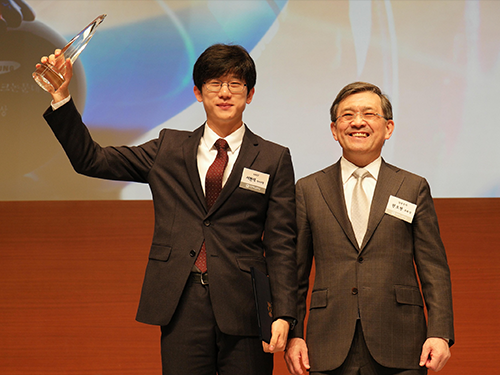 Ph.D. Candidate Seo Wins the Human Tech Paper Award
Hyun-Suk Seo, a doctoral student of KAIST’s Department of Electrical Engineering, received the grand prize of the “22nd Human Tech Paper Award” on February 3, 2016 from Samsung Electronics Co., Ltd.
Seo was the first to receive this prize ever since the Human Tech Paper Award was established 22 years ago. Until last year, the highest prize awarded for KAIST was a gold one.
The “Human Tech Paper Award” was established in 1994 by Samsung Electronics to discover and support outstanding scientists in the field of electrical engineering.
Entitled “Self-Gated Cardiac Cine MRI Using Phase Information,” Seo’s paper presented a technology that would reduce discomforts and inconveniences experienced by patients who take a magnetic resonance imaging (MRI).
This technology uses the speed changes of aorta and the abdominal movements of body to obtain the phase changes of magnetic resonance signals so that MRIs may be taken despite the organs’ movements.
Seo commented on his research, “I wanted to develop a technique that can make MRI a more comfortable experience. I will continue my research on this subject and hope to serve the needs of the society.”
In addition, the “Special Award,” which is given to schools, was awarded to KAIST. KAIST’s Department of Electrical Engineering has also been named the department that has received the second most awards (15 awards) this year.
Oh-Hyun Kwon, Vice President of Samsung Electronics, Steve Kang, President of KAIST, and Nak-In Seo, President of Seoul National University, participated in the event.
Picture: Hyun-Suk Seo (left), the recipient of the grand prize of the 2016 Human Tech Paper Award, and Oh-Hyun Kwon (right), Vice President of Samsung Electronics
2016.02.06 View 9745
Ph.D. Candidate Seo Wins the Human Tech Paper Award
Hyun-Suk Seo, a doctoral student of KAIST’s Department of Electrical Engineering, received the grand prize of the “22nd Human Tech Paper Award” on February 3, 2016 from Samsung Electronics Co., Ltd.
Seo was the first to receive this prize ever since the Human Tech Paper Award was established 22 years ago. Until last year, the highest prize awarded for KAIST was a gold one.
The “Human Tech Paper Award” was established in 1994 by Samsung Electronics to discover and support outstanding scientists in the field of electrical engineering.
Entitled “Self-Gated Cardiac Cine MRI Using Phase Information,” Seo’s paper presented a technology that would reduce discomforts and inconveniences experienced by patients who take a magnetic resonance imaging (MRI).
This technology uses the speed changes of aorta and the abdominal movements of body to obtain the phase changes of magnetic resonance signals so that MRIs may be taken despite the organs’ movements.
Seo commented on his research, “I wanted to develop a technique that can make MRI a more comfortable experience. I will continue my research on this subject and hope to serve the needs of the society.”
In addition, the “Special Award,” which is given to schools, was awarded to KAIST. KAIST’s Department of Electrical Engineering has also been named the department that has received the second most awards (15 awards) this year.
Oh-Hyun Kwon, Vice President of Samsung Electronics, Steve Kang, President of KAIST, and Nak-In Seo, President of Seoul National University, participated in the event.
Picture: Hyun-Suk Seo (left), the recipient of the grand prize of the 2016 Human Tech Paper Award, and Oh-Hyun Kwon (right), Vice President of Samsung Electronics
2016.02.06 View 9745 -
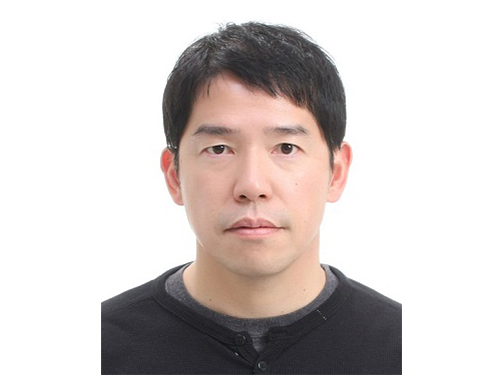 Professor Naehyuck Chang Appointed a 2015 Fellow by the ACM
The Association for Computing Machinery (ACM), the world’s largest educational and scientific computing society, released a list of its new fellows on December 8, 2015, the 2015 ACM Fellows.
Professor Naehyuck Chang of the School of Electrical Engineering at KAIST was among the 42 new members who became ACM Fellows in recognition of their contributions to the development and application of computing in areas from data management and spoken-language processing to robotics and cryptography.
Professor Chang is known for his leading research in power and energy optimization from embedded systems applications to large-scale energy systems such as device- and system-level power and energy measurement and estimation, liquid crystal display power reduction, dynamic voltage scaling, hybrid electrical energy storage systems, and photovoltaic cell arrays. He is the fourth Korean to be nominated an ACM Fellow.
Professor Chang is also a Fellow of the Institute of Electrical and Electronics Engineers (IEEE) and the Editor-in-Chief of the journal, ACM Transactions on Design Automation of Electronic Systems (TODAES). He served as the President of the ACM Special Interest Group on Design Automation in 2012.
Additional information about the ACM 2015 Fellows, go to http://www.acm.org/press-room/news-releases/2015/fellows-2015:
2015.12.11 View 9937
Professor Naehyuck Chang Appointed a 2015 Fellow by the ACM
The Association for Computing Machinery (ACM), the world’s largest educational and scientific computing society, released a list of its new fellows on December 8, 2015, the 2015 ACM Fellows.
Professor Naehyuck Chang of the School of Electrical Engineering at KAIST was among the 42 new members who became ACM Fellows in recognition of their contributions to the development and application of computing in areas from data management and spoken-language processing to robotics and cryptography.
Professor Chang is known for his leading research in power and energy optimization from embedded systems applications to large-scale energy systems such as device- and system-level power and energy measurement and estimation, liquid crystal display power reduction, dynamic voltage scaling, hybrid electrical energy storage systems, and photovoltaic cell arrays. He is the fourth Korean to be nominated an ACM Fellow.
Professor Chang is also a Fellow of the Institute of Electrical and Electronics Engineers (IEEE) and the Editor-in-Chief of the journal, ACM Transactions on Design Automation of Electronic Systems (TODAES). He served as the President of the ACM Special Interest Group on Design Automation in 2012.
Additional information about the ACM 2015 Fellows, go to http://www.acm.org/press-room/news-releases/2015/fellows-2015:
2015.12.11 View 9937 -
 Professor Naehyuck Jang was Appointed Technical Program Chair of the Design Automation Conference
Professor Naehyuck Jang of the Electrical Engineering Department at KAIST was appointed as the technical program chair of the Design Automation Conference (DAC). He is the first Asian to serve the conference as the chair. At next year’s conference, he will select 150 program committee members and supervise the selection process of 1,000 papers.
Founded in 1964, DAC encompasses research related to automation of semiconductor processes, which usually involve billions of transistors. More than seven thousand people and 150 companies from all around the world participate, of which only the top 20% of the submitted papers are selected. It is the most prestigious conference in the field of semiconductor automation.
The Design Automation Conference also introduces optimization and automation of design processes of systems, hardware security, automobiles, and the Internet of things. Professor Jang specializes in low power system designs. As an ACM Distinguished Scientist, Professor Jang was elected as the chairman after contributing to this year’s program committee by reforming the process of selection of papers.
Professor Jang said, “This year’s conference represents a departure, where we move from the field of traditional semiconductors to the optimization of embedded system, the Internet of things, and security. He added that “we want to create a paper selection process that can propose the future of design automation.”
The 53rd annual DAC will take place at the Austin Convention Center in Texas in June 2016.
2015.07.02 View 7391
Professor Naehyuck Jang was Appointed Technical Program Chair of the Design Automation Conference
Professor Naehyuck Jang of the Electrical Engineering Department at KAIST was appointed as the technical program chair of the Design Automation Conference (DAC). He is the first Asian to serve the conference as the chair. At next year’s conference, he will select 150 program committee members and supervise the selection process of 1,000 papers.
Founded in 1964, DAC encompasses research related to automation of semiconductor processes, which usually involve billions of transistors. More than seven thousand people and 150 companies from all around the world participate, of which only the top 20% of the submitted papers are selected. It is the most prestigious conference in the field of semiconductor automation.
The Design Automation Conference also introduces optimization and automation of design processes of systems, hardware security, automobiles, and the Internet of things. Professor Jang specializes in low power system designs. As an ACM Distinguished Scientist, Professor Jang was elected as the chairman after contributing to this year’s program committee by reforming the process of selection of papers.
Professor Jang said, “This year’s conference represents a departure, where we move from the field of traditional semiconductors to the optimization of embedded system, the Internet of things, and security. He added that “we want to create a paper selection process that can propose the future of design automation.”
The 53rd annual DAC will take place at the Austin Convention Center in Texas in June 2016.
2015.07.02 View 7391